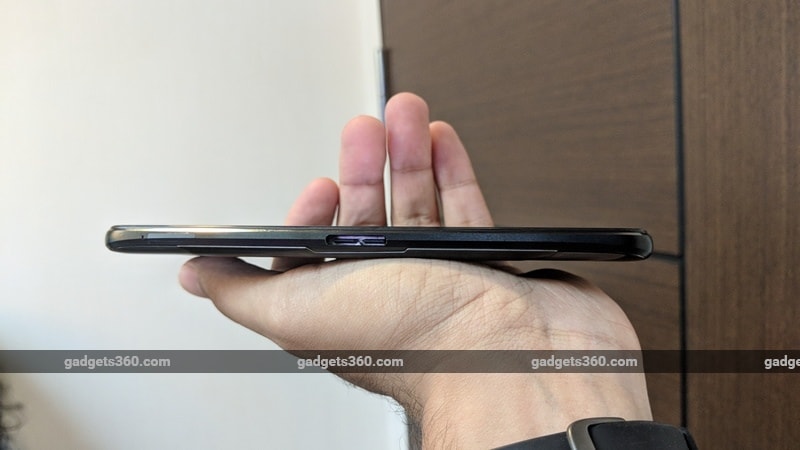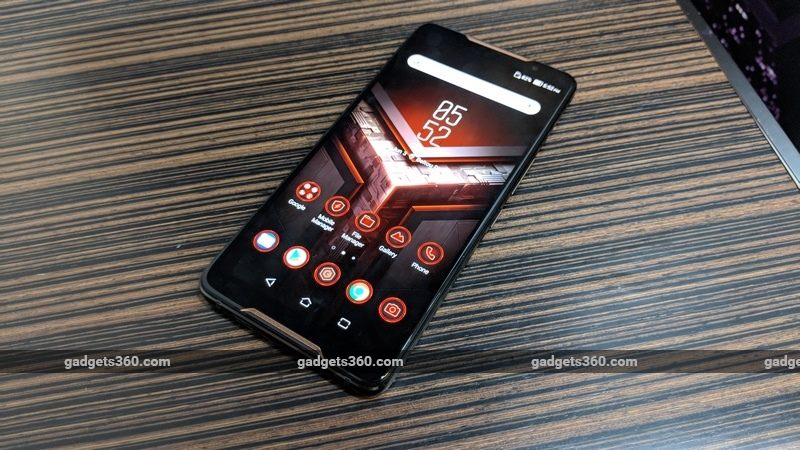
Each year at Computex, Asus shows off at least one crazy new concept product – it might be a laptop with a screen on the lid, a phone that docks into a tablet, or even a domestic robot that can entertain your family. This year, at the first of two scheduled events, the showstopper was something equally attention-grabbing – but also a lot more grounded in reality. The brand new ROG Phone takes smartphone design, power, and performance to a completely new level. Asus seems to have found a niche that could actually do with some innovation, and a lot of thought has gone into this product and its surprisingly robust lineup of accessories. Perhaps the best news of all is that this isn’t some wild flight of fancy that will never make it to the market. In fact, Asus has told Gadgets 360 that it intends to bring this phone to India very soon. Read on for everything you need to know about what’s new and different, and how it actually works.
First of all, the Asus ROG Phone is not significantly larger or heavier than today’s big phones. It’s 8.6mm thick and weighs 200g, but handling it is not that much more difficult than using any other oversized phone. The rear is not very slippery, but does get smudged immediately. The orangish accents on the rear match some of Asus’ ROG laptops.
Asus has gone in a completely different direction than pretty much all of today’s high-end phones. The ROG Phone doesn’t look particularly slick and it most definitely doesn’t have a notch. What you do get is a bold, aggressive style that prioritises both actual gaming and the “gamer” aesthetic – and yes, the logo at the back lights up with customisable RGB LEDs.
There are plenty examples of the gaming-first philosophy. There’s enough space above and below the 6-inch screen for front-firing stereo speakers. There are ultrasonic virtual shoulder buttons to give you an edge in games. There’s an accessory port on the side for docking in landscape mode and also charging the phone while you’re playing, so a wire doesn’t stick out where your hand needs to be. And the accessories shown off at the launch event include a hand-held grip with an extra screen, a wireless TV streaming attachment that also gives you physical buttons and analogue sticks, and a desktop dock that lets you play on any monitor with a keyboard and mouse.

All the games we saw running on the ROG Phone’s screen looked amazing. This is an 18:9 2160×1080 HDR AMOLED panel with a 90Hz refresh rate and 1ms response time, which Asus says make it a world first. It can also reproduce 108 percent of the DCI-P3 colour gamut. Sound quality with the two speakers and dual amplifiers is another thing that Asus is promoting, but we weren’t able to get a good sense of audio quality at the preview event held by Asus prior to the official unveiling. The ROG Phone can handle 24-bit/ 192Khz high-resolution audio playback, and supports DTS Headphone:X audio optimisation.
On the inside, you get not only the latest and greatest Qualcomm Snapdragon 845 processor, but a specially cherry-picked version of it that will run at 2.96GHz as opposed to 2.8GHz. There’s 8GB of RAM, up to 512GB of storage, and a 4000mAh battery. One very interesting feature is support for Wi-Fi 802.11ad, which will be commonly branded as WiGig, and enables lag-free wireless display mirroring. Asus has designed a vapour-chamber cooling system plus a clip-on accessory with a fan – how exactly these work together and what levels of performance you can get with and without the fan are not yet completely clear (and as we saw, the fan won’t fit on the ROG Phone when you’re using any of the docking accessories).

Asus is boasting of an AnTuTu score of 304,183 and a 3DMark Ice Storm Unlimited score of 66,874, which would absolutely shatter all previous records set by the current flagship phones that we have tested – and also the Xiaomi BlackShark and Razer Phone, according to Asus. How this phone handles heat will be a huge question to be answered when we get it in for a full review, but Asus claims that the processor can run at peak speed for 5x longer than similar phones without its custom cooling system.
Apart from all the gaming-centric features, there are still all the goodies that high-end phone buyers would expect, such as dual rear cameras, face recognition, and quick charging. You get the latest version of Android and Asus’ ZenUI with heavy visual customisation – which we would say is the only cheesy part of this device.
The UI style is not to our personal taste, but we’re sure some people will love it. You can squeeze the sides of the ROG Phone to enable or disable X Mode, which turns everything red and changes the homescreen wallpaper with a quick animation. This is essentially a gaming mode that prioritises game-related performance parameters, but we’ll know more about this and other software tweaks after the device is released.
Finally, we were able to spend some time with the three docking accessories that Asus has launched along with the ROG Phone. The first, and potentially most popular, is the TwinView Dock, which has a second screen of its own. Asus says it is working with developers to make use of it, but the possibilities seem quite limited as of now. We wonder why there aren’t physical controls there, like with the Gamevice Asus WiGig Dock. This not only lets you mirror your screen on a TV wirelessly, but also lets you play like you’re holding a console controller. It’s somewhat unwieldy, but great fun, especially when combined with the phone’s own motion-sensing capabilities.
Last but not least, the desktop dock is something that phone manufacturers have been trying to pull off successfully for years. The promise of an office in your pocket might not have tempted many people, but this is a new use case scenario, and we can see its appeal. The support for keyboard and mouse controls is implemented by Asus, and game developers can come on board to support it themselves.

Asus is undoubtedly going to be pushing the ROG Phone aggressively. The company has done its research and knows how big Fortnite and PlayerUnknown’s Battlegrounds are today. What’s most interesting about this launch is that it brings together the massive conglomerate’s ROG design and manufacturing chops and with the booming smartphone business, in a single, well-timed product that
There’s no doubt that the ROG Phone isn’t going to come cheap. Given the specifications and engineering that go into it, we’d expect its price to be significantly higher than that of the ZenFone 5z. China would seem like the most obvious place to make a big push, but we’re told that the ROG Phone could launch very soon in India. Given that we’re still waiting for the ZenFone 5z to make it to our shores, we’ll hold on till we have concrete information before getting too excited.
Disclosure: Asus sponsored Gadgets 360 correspondent’s flights and hotel for the launch event in Taipei.
For the latest tech news and reviews, follow Gadgets 360 on Twitter, Facebook, and subscribe to our YouTube channel.
[“Source-gadgets.ndtv”]












